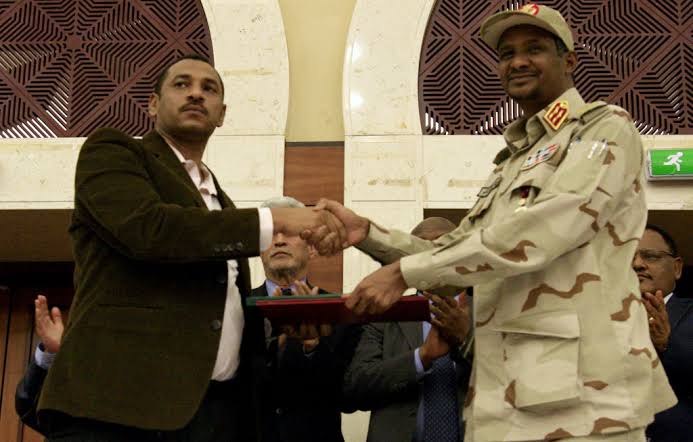Sudan: Military Council and civilian protesters sign power-sharing deal

The signing ceremony held in the capital, Khartoum, after marathon overnight talks, marks an important step in the transition to civilian rule following the military overthrow of long-ruling autocrat Omar al-Bashir amid mass protests in April.
But the military appears to have the upper hand, following weeks of negotiations and a deadly crackdown last month in which security forces violently dispersed the protesters’ main sit-in.
The document signed Wednesday would establish a joint civilian-military sovereign council that would rule Sudan for a little over three years while elections are organized. A military leader will head the 11-member council for the first 21 months, followed by a civilian leader for the next 18.
It marks a significant concession by the protesters, who had demanded an immediate transition to civilian rule. The pro-democracy movement would appoint a Cabinet, and the two sides would agree on a legislative body within three months of the start of the transition.
But negotiators have yet to agree on a division of powers between the sovereign council, the Cabinet and the legislative body, which would be enshrined in the constitutional document. That document, which they hope to adopt in talks scheduled for Friday, would also set the terms of military leaders’ potential immunity from prosecution.
“This is the big hurdle. Sudan’s future after al-Bashir will be defined by this constitutional declaration,” said Rasha Awad, editor of the online Sudanese newspaper Altaghyeer.
The military has said the sovereign council should be able to veto appointments to the Cabinet and Cabinet decisions, something the protesters fear would deprive it of any real power. The protesters have also said that members of the council should be stripped of immunity if they are implicated in last month’s crackdown.
The Communist Party said it and some other factions rejected the deal signed Wednesday because it didn’t include the immediate handover of power to civilians and did not provide for an international investigation of the violence.
Protest organizers say security forces killed at least 128 people during last month’s crackdown. Authorities put the death toll at 61, including three members of the security forces. The two sides have agreed on a Sudanese investigation into the violence, but have yet to outline its scope.
Hundreds of people took to the streets of Khartoum on Wednesday, mostly to celebrate the deal.
How to submit an Op-Ed: Libyan Express accepts opinion articles on a wide range of topics. Submissions may be sent to oped@libyanexpress.com. Please include ‘Op-Ed’ in the subject line.
- Haftar to fly to the US with family, pretending it’s a Libyan official visit - September 13, 2021
- Haftar hires ex-Clinton aide, ex-Republican leader to lobby Washington for Libya elections’ run - September 09, 2021
- Al-Saadi Gaddafi, late dictator’s son, released from Libyan prison - September 06, 2021


